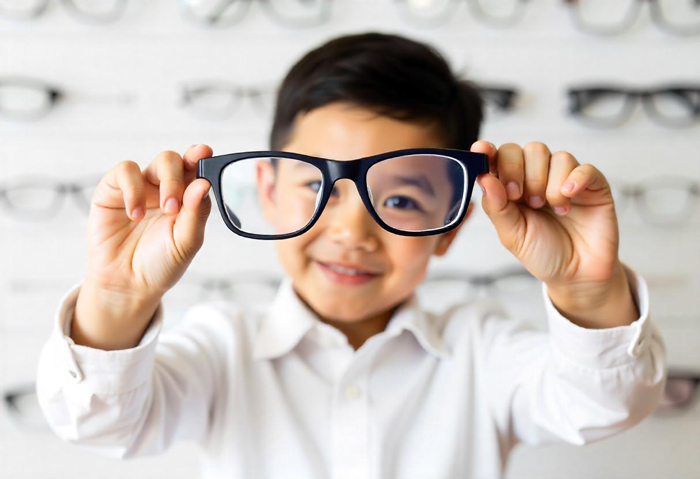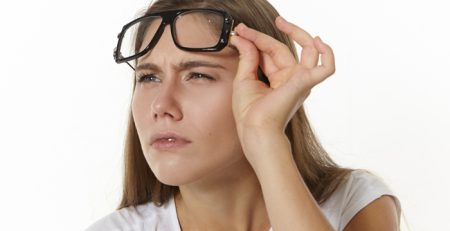Myopia Control for Children: Slowing Progression & Protecting Vision
Childhood myopia, or short-sightedness, is highly prevalent in Singapore, often progressing rapidly if left unmanaged. Effective myopia control can significantly reduce the risk of severe eye health complications, such as retinal detachment, glaucoma, cataracts, and macular degeneration, later in life.
Importance of Early Myopia Control
Prevent Rapid Progression: Early intervention can substantially slow the advancement of myopia in children, preserving their long-term vision.
Protect Ocular Health: Proactive measures significantly reduce risks of serious vision-threatening conditions associated with high myopia.

Comprehensive Myopia Control Methods
Orthokeratology (Ortho-K) Lenses
- Specially designed rigid gas-permeable lenses worn overnight.
- Gently reshapes the cornea, temporarily correcting vision.
- Proven to slow axial elongation of the eye, effectively reducing myopia progression.
- Ideal for active children who prefer daytime freedom from corrective eyewear.
Low-Dose Atropine Eye Drops
- Clinically validated treatment administered nightly.
- Significantly slows down myopia progression by affecting specific receptors in the eye.
- Safe, minimally invasive, and effective, with extensive research backing its use.
MiSight and DIMS Specialized Lenses
- Innovative spectacle and contact lens technologies specifically engineered for myopia control.
- Adjust peripheral vision to control axial lengthening of the eyeball, directly addressing myopia progression.
- Suitable for daily use, offering comfort, convenience, and reliable vision correction.
Lifestyle Adjustments
- Increasing outdoor activity has shown a measurable impact in reducing myopia progression.
- Reducing prolonged near-work tasks, such as excessive screen time, enhances the effectiveness of clinical interventions.
FAQs for Myopia Control in Children
Get detailed answers about managing your child’s myopia and safeguarding their future vision.
What is myopia control for children?
Specialized treatments aimed at slowing myopia progression in children, reducing future vision problems.
What are MiSight/DIMS lenses, and are they suitable for my child?
Specialized lenses clinically proven to slow myopia progression. Ideal for most children and teens with progressing myopia.
How often should my child have an eye exam?
Regular exams every 6–12 months are recommended for monitoring and adjusting treatments.
Are there side effects of atropine eye drops?
Side effects are generally mild and temporary, such as slight pupil dilation. Long-term safety and effectiveness are well-documented.
Is Ortho-K safe for children?
Yes. Ortho-K is a safe, widely-used treatment, FDA-approved, and effective for many children.
Optimal Age for Myopia Control
Early initiation of myopia control methods (ages 6–16) ensures optimal effectiveness and significantly reduces long-term visual health risks.
Myopia Treatment for Adults: Vision Correction & Long-Term Management
Adult myopia treatment prioritizes long-term vision stability, reduced dependence on corrective eyewear, and minimizing the risk of severe eye conditions that commonly accompany higher levels of myopia.
Why Adults Need Myopia Treatment
Vision Stability and Quality: Consistent and clear vision improves quality of life and reduces inconveniences associated with eyewear dependency.
Long-term Ocular Health: Effective treatment and monitoring significantly reduce risks of complications, including retinal tears, glaucoma, and cataracts.

Advanced Treatment Options for Adults
Refractive Surgery (LASIK, SMILE, ICL)
- LASIK: Uses advanced laser technology to reshape the cornea for permanent vision correction, with rapid recovery and minimal discomfort.
- SMILE: Minimally invasive surgery that corrects myopia by creating a tiny lenticule, ensuring fast healing and reduced postoperative dryness.
- Implantable Collamer Lens (ICL): Suitable for higher prescriptions, this reversible procedure involves placing a biocompatible lens inside the eye to permanently correct vision.
Customized Prescription Glasses & Contact Lenses
- Precisely tailored optical corrections to improve daily visual performance, comfort, and lifestyle suitability.
- Ideal for patients seeking flexible and non-invasive treatment options.
Routine Myopia Management Strategies
- Regular comprehensive eye examinations to monitor myopia progression and ocular health.
- Tailored advice on lifestyle changes, dietary adjustments, and protective eyewear to manage and prevent complications.
FAQs for Myopia Treatment in Adults
Clarify your questions about adult myopia treatment options.
What are the best myopia treatments for adults?
LASIK, SMILE, ICL surgery, and advanced contact lenses are popular and effective options offering permanent or semi-permanent solutions.
Am I a candidate for LASIK or SMILE surgery?
Ideal candidates typically have stable vision, healthy eyes, and realistic expectations. An evaluation can confirm suitability.
Can myopia be cured in adults?
While it can’t be completely reversed, surgical treatments provide permanent vision correction that significantly improves vision quality.
How often should adults have eye exams for myopia?
Regular examinations every 1–2 years, or sooner if vision changes are noted, help maintain optimal eye health.
Who Should Consider Myopia Treatment?
Adults experiencing frequent vision fluctuations, visual fatigue, or those who desire permanent solutions to reduce or eliminate dependence on corrective lenses.
Comprehensive Eye Examinations: Essential for Myopia Management
Routine eye examinations are the foundation of effective myopia management, essential for accurately diagnosing myopia, assessing progression, and personalizing treatment strategies.
Importance of Regular Myopia Exams
- Early Intervention and Monitoring: Detect myopia progression early, enabling prompt intervention and personalized management.
- Prevention of Complications: Comprehensive assessments detect early signs of conditions such as retinal detachment, glaucoma, and cataracts, facilitating timely treatments.
What to Expect in a Myopia Examination?
- Visual Acuity Testing: Measures precise clarity of vision across varying distances.
- Refraction Assessment: Determines accurate prescription strength, essential for effective corrective treatment.
- Eye Health Evaluation: Thorough examination of the ocular structures, including retina, cornea, and optic nerve health.
- Myopia Progression Analysis: Monitoring changes in ocular dimensions and prescription to adapt management plans accordingly.
Recommended Examination Frequency
Children: Every 6–12 months, ensuring optimal control of myopia progression.
Adults: Every 1–2 years, or more frequently if noticeable visual changes or symptoms occur.
Schedule Your Consultation Today
Take control of your vision health at Cornerstone Eye Centre, where our expert ophthalmologists provide personalized myopia management plans tailored to your unique needs.
If you’re looking for a trusted myopia clinic in Singapore, book your appointment today and start your journey toward better eye health. Call us now to schedule your consultation!
